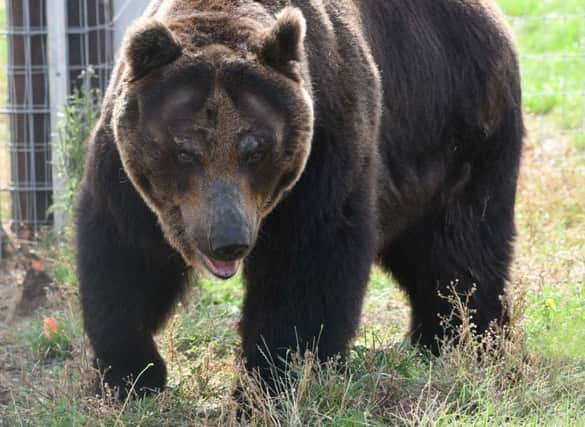Endangered brown bears arrive at Yorkshire Wildlife Park


The detailed operation was constructed over the last two months to create a safe and efficient journey over 5,400 miles from Japan to the UK.
The four bears, who travelled with one of YWP’s Animal Managers Simon Marsh and vet Alan Tevendale were transported in temperature-controlled conditions on the cross-continent transfer. They are now settling into their house after the long journey and will be gradually introduced to their extensive reserve at the Park.
Advertisement
Hide AdAdvertisement
Hide AdRiku, Kai, Hanako and Amu were previously housed as part of an exhibit in outdated cages at the Ainu Cultural Museum on Hokkaido, the northernmost of Japan’s islands and urgently needed new facilities. Unfortunately, there was no capacity in Japanese zoos to take them, so YWP stepped in.
YWP and local experts spent nearly seven hours moving the four bears from the bleak cramped cages into specially constructed transport crates ready for their journey.
YWP Animal Manager Debbie Porter said: “The loading went like clockwork.”
The team, including an English and two Japanese vets, started the loading process at 4.30am and tempted the bears with food to move out of their original cages.
Advertisement
Hide AdAdvertisement
Hide AdDebbie added: “The 27-year-old female Hanako was very playful when we were loading her – at one point she tried to grab a hose pipe, she was very curious about what was going on. She is very sassy and extremely bright. She does like people so it should be quite fun when we get her settled at home.
“The bears were then taken to the airport in an air-conditioned lorry provided by DHL Japan.”
“Once we had finished it, it was unbelievable, I actually took a photo of the empty cages because you think for 27 years they have been in that tiny caging.”
“It was a very emotional day. Everybody was really pleased to take part in something so big. It had a really lovely feel to it.”
Advertisement
Hide AdAdvertisement
Hide AdAfter being taken to the local airport they were flown on two flights to Tokyo and then overnight on Thursday into London’s Heathrow Airport. Safe in the UK, the four bears were carefully unloaded from the plane at 7am before being checked over ready for the final road leg of their trip to Doncaster.
They arrived at the park at 12.30 pm to the delight of the staff who were anxiously awaiting their arrival. The crates were carefully unloaded and set against the house that was at the centre of their new home in the Rehabilitation reserve at the Park.
One by one the slides were lifted and the bears took their first steps into their new home. Hanako was the first to leave her crate – pawing at the floor with impatience as the crate was locked into position, it was almost as if she knew she was home.
She was quickly out, dived straight into her food, splashed in her water trough and triumphantly rolled in the deep straw bed before throwing the straw around.
Advertisement
Hide AdAdvertisement
Hide AdThe two younger males were next – both confidently coming out into their new home. The oldest bear Amu was left quietly for several hours to make his own mind up about coming out of his crate as he was the most reluctant.
The bears will spend a few quiet days in their house, not knowing of the expansive reserve that lies beyond it.
They will be slowly acclimatised to going outside into the smaller enclosed area beyond the house before being allowed to venture into the main reserve.
The Yorkshire Wildlife Park was chosen as their new home because of its experience in conservation of at-risk species and rehoming animals in need.
Advertisement
Hide AdAdvertisement
Hide AdThe Park had a great response to a DIY SOS call to companies and tradespeople to help kit the reserve out with rocks, trees, platforms and other environmental features. The volunteers were busy the day before the bears arrived working on the reserve while the bears started their long journey to the UK.
The Ussuri Brown Bear is on the IUCN Red List of Threatened Species due to their vulnerability to habitat loss, illegal hunting for body parts and skins. There are estimated to be around 10,000 in Japan. The Ussuri Brown Bears are also known as the Black Grizzly, can weigh up to 550Kg and live up to 35 years.